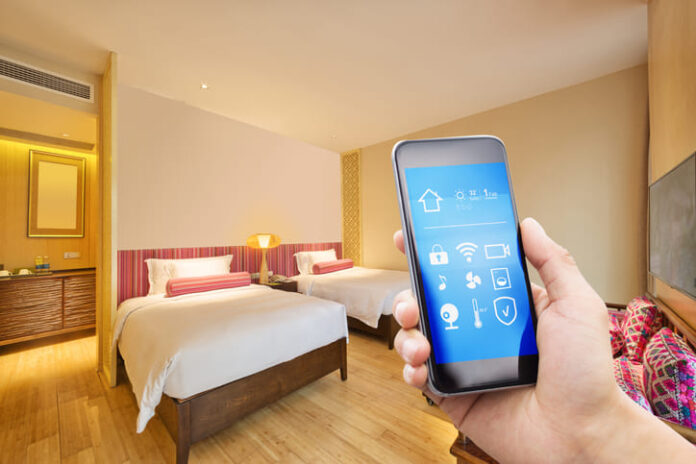At the airport in Riyadh, a couple checks in their luggage and boards their flight to Red Sea International, where a waiting seaplane whisks them away to their luxury resort destination in Ummahat Islands. When they open the door to their villa, they find their luggage waiting.
It’s all thanks to a smart luggage system that tags, tracks, transports, and delivers guest bags from airport to hotel room, one of the ways hotels can embrace technology to streamline operations and offer travelers hassle-free baggage handling and elevated customer experiences.
One other way is to use solar water heaters connected to sensors that collect real-time data on energy usage and water temperatures. Hotels can use the data to optimize water temperatures in baths, taps, and showers. An in-room intelligent control dashboard can enable guests to change water temperatures according to their preferences.
Smart automation through Internet-of-Things (IoT) technologies can have a great positive impact on hospitality operations. It’s time resorts and hotels seriously consider how they can use them to improve business operations and, ultimately, their bottom line. The possibilities are virtually endless, and the following are only some of them:
1. Smart Room Automation
Guests crave comfort and services that feel intuitive and tailored to their habits. With IoT deployed in hotel rooms, you can deliver just that. Smart thermostats set the perfect room temperature before guests even step inside, and lights automatically shift from daylight white in the morning to warm amber in the evening.
One can always gauge the quality of a hotel in its bedroom curtains. Layered curtains of sheer fabric beneath thick and luxurious light-blocking floor-length drapes in a solid color, a subtle print, or a damask pattern are standard in luxury properties. Now imagine those beautiful curtains opening to greet the sunrise or closing for privacy automatically at set times or with the flick of a virtual switch on a screen control panel that controls not only the curtains but everything else in the room that affects guest comfort.
2. Energy Management
Motion-activated systems can cut energy consumption by dimming lights and adjusting cooling in unoccupied common and private spaces. As mentioned above, solar water heating systems can be connected to intelligent monitoring frameworks that capture, store, and share energy data and insights on performance efficiency.
Hotel chains can also collect energy data across multiple locations and use the data to train machine learning models that can yield valuable insights on energy efficiency and utility bill cost-cutting measures.
3. Keyless Entry
Keyless entry is one of the most commonly adapted hotel automation technologies. Confirmed guests, especially past guests and members of hotel loyalty programs, can bypass the front desk altogether and access their rooms with a digital key on their phone. There’s no need to wait in long check-in queues—so it’s a better experience—and no misplacing hotel cards, too.
Smart locks can also enhance security. Ingress and egress data can be automatically logged and recorded in a central database, maybe even with an accompanying 10-second video footage of the hallway outside before and after entry. Need to authorize temporary access to maintenance staff or cleaners? The control room can do it remotely.
Access logs can be routinely reviewed and brought up in case there’s a need to review a specific entry or exit. Anonymized access data can also be processed to yield guest behavior insights that the hotel can use to improve its accommodation offerings.
4. Predictive Maintenance
Maintenance issues can disrupt the guest experience. A sudden elevator malfunction or an air-conditioner breakdown during the peak of the summer heat are moments you don’t want to happen on your property, but they still happen anyway.
You can, however, limit their frequency through the use of predictive maintenance technology. You can install monitoring equipment and sensors and feed the data into computer programs that tell you when equipment is about to break down (according to big data) and needs maintenance.
This reduces downtime because you don’t disrupt operations for unnecessary upkeep but can perform maintenance before equipment breaks down.
5. Optimized Housekeeping
Smart housekeeping solutions can improve housekeeping speed and efficiency. A hotel can use software to optimize the resource management of housekeeping staff and plot housekeeping routes and schedules according to occupancy data, which is automatically pulled from guest reservations.
Housekeeping staff can get automatic alerts via a mobile app. They can be notified when guests check out of the rooms in their routes, and this can shave time off from the back-and-forth between the staff, the front desk, and the housekeeping coordinator.
Inventory tracking adds another layer of efficiency. Sensors monitor supplies like toiletries, linens, and cleaning products in the room. This way, housekeeping can focus on replenishing what needs replacing. The guests in the room will be happy because they’re not missing anything, the hotel becomes more efficient in its use of resources, and the resulting smoother operations translate to a flawless front-facing experience.
The Future is Smart for Hotels
IoT technologies can improve hotel operations. Automate rooms for greater guest comfort and control, cut down on your energy consumption and electricity bills, facilitate faster check-ins with keyless entry, minimize costly downtimes with predictive maintenance, and optimize housekeeping operations with housekeeping programs.
Adopting smart technologies is no longer optional. It’s key to staying competitive in the hotel business. If you have yet to use automation systems in hotel operations, you’re leaving money on the table for your competitors.



































